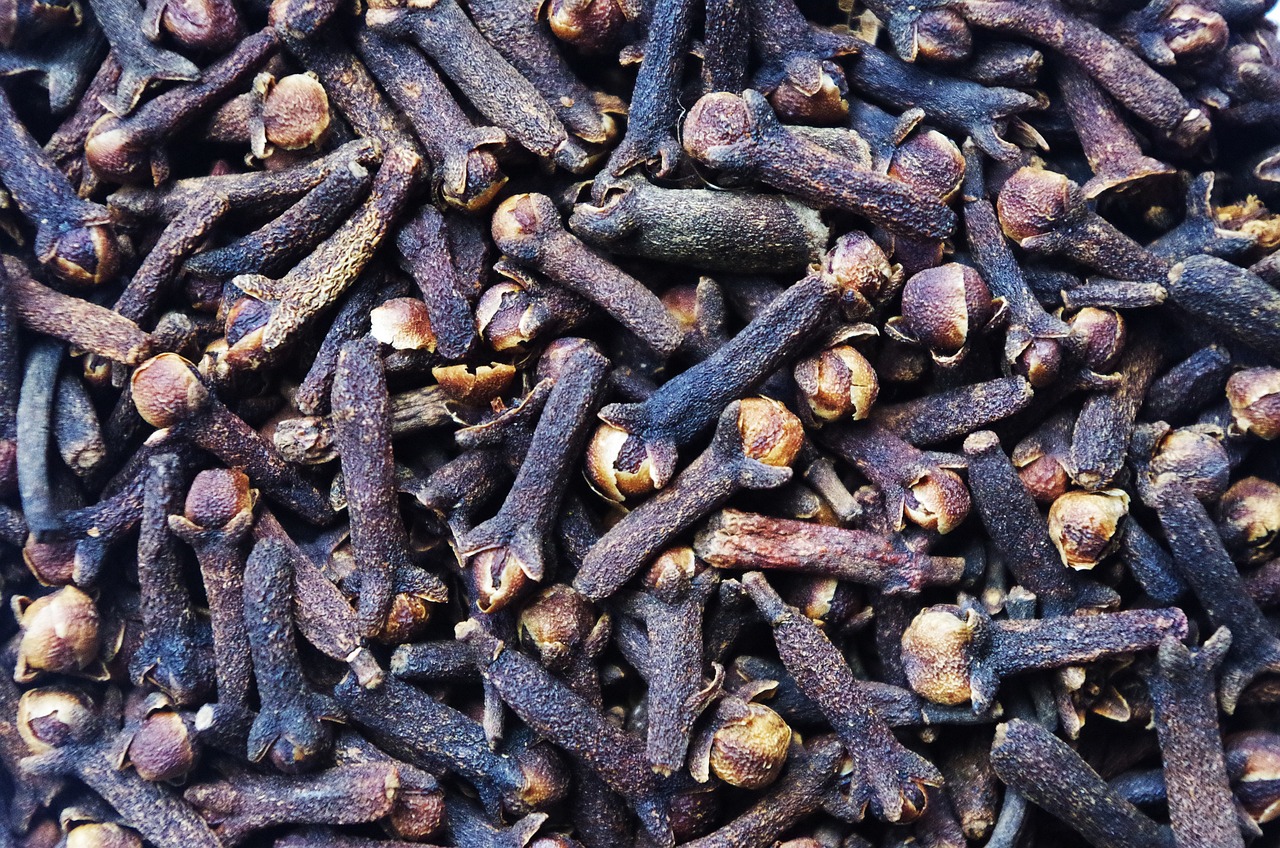
Clove is spice made from the immature reddish-brown flower buds of the clove tree (Syzygium aromaticum). Native to Indonesia, cloves have held significant importance in the spice trade since ancient times. The buds are harvested and dried to produce the nail-shaped brown spice. Cloves have a strong, warm flavor with a touch of sweetness and a highly aromatic, spicy aroma, making them a key ingredient in various dishes. Apart from its culinary uses, it has many medical properties and is used as an aromatic in the perfumery industry. The main active ingredient in clove is eugenol, which contributes to its unique flavor, aroma, and various health benefits. Let us look at its importance in detail.
- Supports immunity- Clove possesses strong antimicrobial properties that aid in combating bacteria, viruses, and fungi, thus lowering infection risks and bolstering the immune system. It is also rich in antioxidants, particularly eugenol, which help neutralize free radicals that can damage cells and weaken immunity. Additionally, clove has anti-inflammatory effects that reduce chronic inflammation, thereby enhancing immune system functionality. It supports respiratory health by alleviating issues like coughs and colds, clearing mucus, and reducing inflammation in the airways. Moreover, clove promotes digestive health, improving nutrient absorption necessary for maintaining a robust immune system. Clove has been suggested to enhance white blood cell activity, improving the body’s defense against infections. It supports liver health and detoxification, which are essential for a healthy immune system by removing toxins. Clove may also improve blood circulation, aiding the efficient delivery of immune cells. Additionally, its antimicrobial properties help maintain a healthy balance of gut bacteria, which is important for a strong immune response.
- Promotes oral health- Clove oil, rich in eugenol, is effective for alleviating toothache pain due to its anesthetic properties. It possesses strong antimicrobial qualities that combat bacteria and pathogens, aiding in the prevention of oral infections, gum disease, mouth ulcers, and oral thrush. Clove also reduces gum inflammation and redness. Regular use of clove oil or related products can help manage gum conditions like gingivitis and periodontitis. Additionally, its pleasant aroma and antibacterial effects combat bad breath, while chewing cloves or using clove-infused mouthwash keeps breath fresh. Clove’s properties also minimize plaque buildup, supporting overall dental health and cleanliness. Furthermore, clove oil can soothe sore gums, particularly after dental procedures or when wearing braces. Clove oil is commonly used after tooth extraction to treat painful dry sockets by alleviating pain and promoting healing while preventing infection. Additionally, clove oil or clove-based toothpaste can gently whiten teeth by removing surface stains, though not as effectively as commercial products. Clove serves as a natural antiseptic in oral care items like toothpaste and mouthwash, supporting overall oral hygiene by reducing harmful bacteria in the mouth.
- Good for skincare- Clove has potent antibacterial properties effective against the bacteria that cause acne. Applying clove oil can reduce acne breakouts by eliminating these bacteria and preventing future infections. Its anti-inflammatory effects diminish redness, swelling, and irritation associated with acne, resulting in clearer skin. Clove, rich in antioxidants like eugenol, combats skin aging by reducing fine lines and wrinkles while boosting collagen production for improved skin elasticity. Additionally, clove oil acts as a natural exfoliant, promoting smoother and brighter skin by unclogging pores. It also enhances blood circulation, contributing to skin vitality and glow, and can reduce the appearance of dark spots and blemishes, creating a more even skin tone. Clove has anti-inflammatory properties that can soothe conditions like eczema, psoriasis, and dermatitis by reducing itching, redness, and discomfort. When mixed with a carrier oil, such as coconut oil, clove oil helps moisturize dry skin and prevents flakiness. It also controls excess oil production, making it useful for oily or combination skin types to reduce the risk of clogged pores and acne. A patch test is recommended before applying clove oil or products to the face to check for any adverse reactions.
- Use in aromatherapy- Clove oil has calming and soothing properties that can reduce stress and anxiety. Its aroma promotes relaxation and mental clarity, helping to balance emotions and provide comfort during emotional distress. The oil can uplift mood and combat mental fatigue by enhancing concentration and focus. Additionally, clove oil has analgesic effects, making it effective for relieving headaches and migraines. It can also deodorize and purify the air in living or working spaces. However, it should always be diluted before skin application and should not be used undiluted in a diffuser for long periods due to its strong scent.
-Triparna







